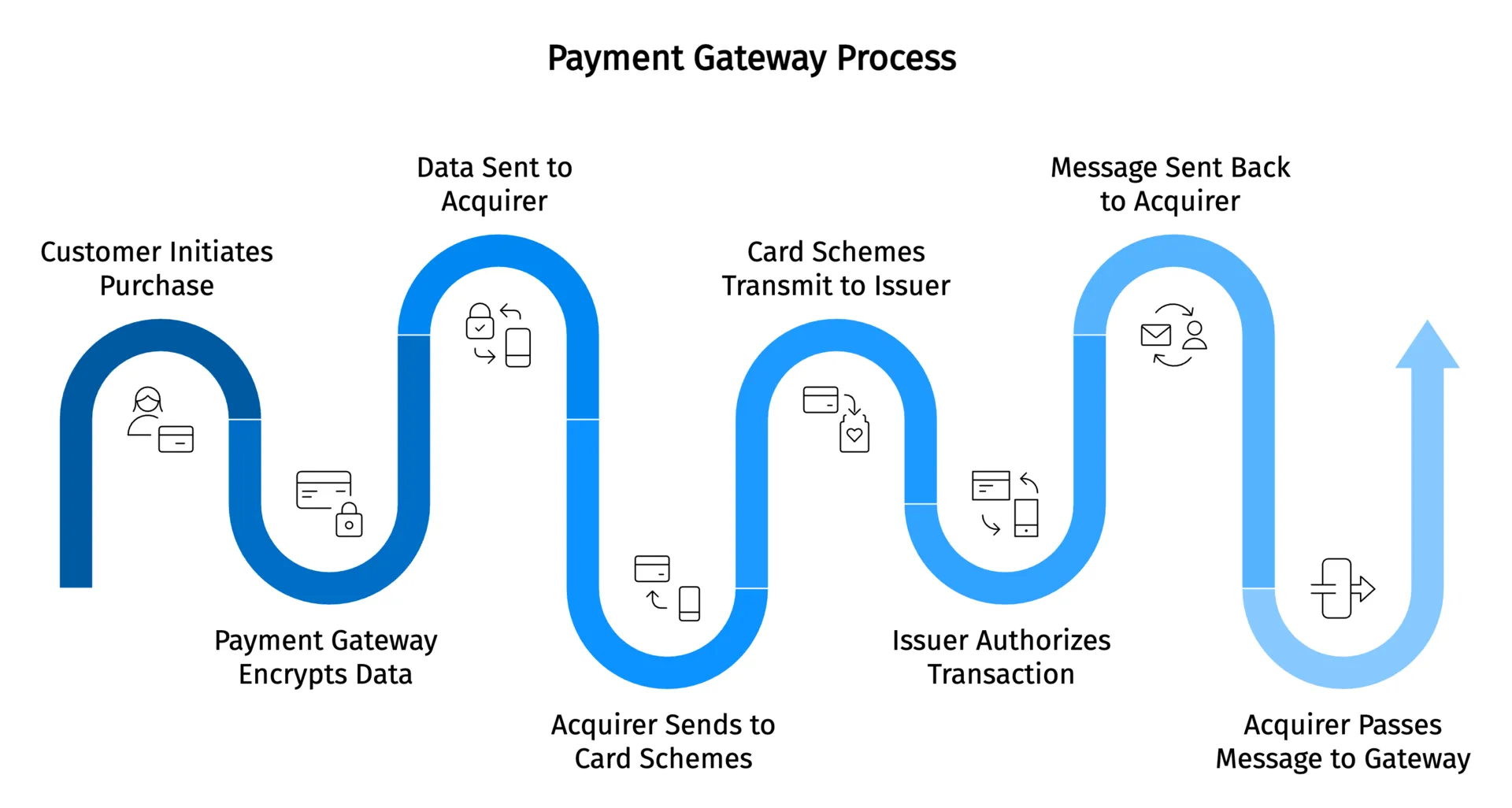Payment Service Provider vs Payment Gateway: Key Differences Explained


At FirmEU, we've helped countless businesses navigate the complex world of online payments. One question we hear almost daily is: "Should I choose a payment service provider or a payment gateway?"
We understand this decision can feel overwhelming, especially when you're focused on growing your business. And running an online business is challenging enough without getting tangled in payment processing jargon.
But here's the good thing: by the end of this guide, you'll have a crystal-clear understanding of both options and know exactly which one is right for your business.
The Quick Breakdown: Payment Service Provider vs Payment Gateway
Before we dive deep into the specifics, let's clarify an important point: most businesses need both gateway functionality (to securely transmit payment data) and processing capabilities (to actually handle the transaction).
At first glance, a payment gateway and a payment service provider (PSP) can appear almost identical. And for businesses in specialized sectors, such as those requiring high-risk banking solutions, understanding these different approaches becomes even more crucial.
After all, both solutions help you collect money from your customers.
But the details matter. Think of a payment gateway as a digital point-of-sale terminal that needs to be connected to additional services, while a PSP bundles the gateway with a complete financial department that handles everything for you.
What is a Payment Gateway?
As payment technology experts, we often explain payment gateways using a simple analogy: imagine a highly secure digital tunnel that connects your customer's wallet to your business bank account.
That's essentially what a payment gateway does – it's the technology that makes online transactions possible and secure.
How does a payment gateway work?
Let's break down what happens when your customer clicks that "Pay Now" button:
- Encryption: The gateway instantly encrypts your customer's sensitive card data
- Verification: It checks the payment details with the customer's bank
- Authorization: The bank confirms if the payment can go through
- Confirmation: You and your customer receive the transaction result
Through our PayFirmly gateway solution, we've optimized this process to happen in milliseconds, ensuring your customers enjoy a smooth checkout experience while maintaining bank-grade security.

Key functions of a payment gateway include:
- Encrypting sensitive payment data
- Routing transactions to the appropriate banks
- Applying fraud prevention measures
- Returning transaction responses
- Supporting various payment methods

Think of it as your store's financial security guard - it checks IDs (validates cards), keeps an eye out for suspicious behavior (fraud detection), and makes sure everyone follows the rules (compliance standards).
What is a Payment Service Provider (PSP)?
When businesses come to us asking about payment service providers, we often describe them as having an entire financial department at their disposal.
For instance, a PSP might include the payment gateway, a merchant account (or at least help you set one up), fraud detection tools, invoicing capabilities, and even analytics dashboards to track sales trends.
It's the difference between hiring individual specialists and bringing in a complete team of experts.
What sets a PSP apart is its comprehensive service package:
_15.webp)
Modern PSPs can process everything from traditional credit cards to the latest payment innovations like digital wallets and buy-now-pay-later options. For businesses looking to expand internationally, PSPs are particularly valuable as they often come with built-in support for multiple currencies and regional payment preferences.
The Technical Side: Payment Service Provider vs Payment Gateway Infrastructure
Let's break down the technical infrastructure in terms everyone can understand.
Payment gateway technical architecture
Think of a payment gateway's technical setup like building a custom house. You need:
- API Integration: Connect your website or app to the payment system
- Security Protocols: Implement SSL encryption and tokenization
- Banking Connections: Establish direct links to card networks and banks
- Compliance Systems: Set up PCI DSS compliance measures
- Fraud Prevention Tools: Integrate specialized security solutions
Our PayFirmly gateway solution provides all these components with well-documented APIs and dedicated technical support, making the integration process smoother for your development team.
PSP technical infrastructure
In contrast, a PSP's technical setup is more like moving into a fully furnished smart home. You get:
- Ready-Made Integration: Single API access to multiple payment services
- Pre-Built Security: Built-in encryption and fraud protection
- Automated Compliance: Integrated regulatory compliance measures
- Multi-Currency Support: Automatic currency conversion and settlement
- Unified Dashboard: Centralized control of all payment operations
The key technical difference? A gateway requires you to build additional infrastructure around it, while a PSP provides the complete technical stack.
When implementing a payment gateway, your development team needs to handle additional integrations with merchant accounts, fraud prevention systems, and other banking relationships.
In contrast, a PSP provides these technical components as part of its unified solution.
Payment Service Provider vs Payment Gateway: What Services Can You Expect?
The range of services between payment gateways and PSPs creates a clear distinction in what your business can achieve with each solution.
A modern payment gateway, like PayFirmly, delivers a robust suite of services. It supports over 100 payment methods, from traditional credit cards to regional favorites like iDEAL, Bancontact, and SOFORT. We've also integrated emerging payment options, including digital wallets and cryptocurrencies via trusted partners.
What truly sets a sophisticated payment gateway apart is its ability to provide:
- Intelligent transaction routing that optimizes approval rates
- Advanced fraud prevention with real-time monitoring
- Comprehensive analytics dashboards for performance insights
- Developer-friendly APIs with plugins for popular e-commerce platforms
PSPs take these capabilities further by bundling additional services into their offering. Beyond payment processing, they manage merchant accounts, handle currency conversions, and provide end-to-end customer support. They typically include:
- Complete merchant account management
- Unified settlement across all payment methods
- Integrated chargeback handling
- Global payment routing capabilities
The choice between the two often depends on your business needs - while some payment gateways offer extensive functionality for businesses with existing financial infrastructure, a PSP might be better suited for those seeking an all-in-one solution.
Payment Service Provider vs Payment Gateway: Understanding the Costs
Let's talk money - and not just the payments you'll process. Understanding the cost structure of each solution can save you from unexpected expenses down the road.
When talking about costs, it's easy to assume PSPs always offer better deals, but that's not always the case, especially with modern payment gateways.

Payment gateway costs
Payment gateway costs typically include:
- Setup fees (one-time investment)
- Monthly maintenance fees
- Per-transaction fees (usually a percentage plus a fixed amount)
- Additional charges for specific features like recurring billing
- Security and compliance fees
PSP costs
PSPs generally operate on a more inclusive pricing model:
- All-in-one monthly fees
- Bundled transaction fees
- Volume-based pricing tiers
- Inclusive security and compliance coverage
Both PSPs and payment gateways can offer volume-based pricing tiers, where your rates improve as your transaction volume grows. The difference is that with a PSP, these discounts typically apply to your all-in-one fee, while with gateways, they might apply specifically to the gateway portion of your overall processing costs.
Cost comparison example
Let's look at a practical example for a medium-sized e-commerce business processing €50,000 monthly (1,000 transactions per month)
Payfirmly + PSP solution:
- Monthly Fee: €100
- Transaction Fees: 2.5%
- Gateway fees: €0,20 per transaction
- Total Approximate Cost: €1550 monthly
PSP solution (with in-house gateway):
- Monthly Fee: €100
- All-Inclusive Transaction Fee: 2.5 % + 0,50 per transaction
- Total Approximate Cost: €1850 monthly
The key difference?
A PSP actually includes payment gateway functionality as part of its service, and you’re paying a premium for this. Utilizing Payfirmly significantly reduces the applicable gateway fees. You’re not choosing between one or the other, but rather between a bundled solution or separate components.
Payment Service Provider vs Payment Gateway: Getting Started with Integration
Integration complexity can make or break your payment implementation timeline. Let's break down what you can expect when implementing each solution.
For example, with PayFirmly, we've simplified the integration process through:
- Developer-friendly APIs with comprehensive documentation
- Pre-built plugins for popular platforms like WooCommerce and Magento
- Customizable checkout processes that match your brand identity
- Dedicated technical support throughout the implementation
But in general, the gateway integration process typically involves:
_8_.webp)
PSP integration usually offers a more streamlined approach:
- Single account setup covering all services
- One-time integration with the PSP's platform
- Built-in testing environments
- Automated compliance checks
- Faster time to market
The main distinction lies in the scope - gateway integration focuses on payment processing, while PSP integration encompasses the entire payment ecosystem.
Our gateway customers particularly appreciate our modular architecture, which allows them to activate additional features as their business grows.
Why You Might Want to Choose a Payment Gateway
Choosing a payment gateway can be the perfect solution when you need precise control over your payment infrastructure. Our experience at FirmEU shows that businesses with existing merchant relationships or specific technical requirements often prefer this route.
You'll maintain full control over your payment stack while leveraging powerful features like intelligent transaction routing and advanced fraud prevention.
Ideal use cases
A payment gateway makes perfect sense for:
- Enterprise-level businesses with established financial partnerships
- Companies requiring highly customized payment flows
- Organizations with in-house technical expertise
- Businesses operating in specific regulatory environments
- Markets where particular payment methods dominate
- Companies wanting to maintain direct banking relationships
The pros and cons to consider
A payment gateway shines in offering detailed customization and control over your payment processes. You'll benefit from features like intelligent routing and advanced security measures, while maintaining existing banking relationships.
However, this flexibility comes with increased responsibility:
- More complex initial setup
- Need for separate merchant accounts
- Higher technical requirements
- Additional security compliance responsibilities
Why You Might Want to Choose a Payment Service Provider
Opting for a PSP offers a streamlined approach to payment processing that many growing businesses find invaluable. Instead of juggling multiple relationships and integrations, you get a comprehensive solution that handles everything from merchant accounts to fraud prevention.
Ideal use cases
PSPs are particularly well-suited for:
- Small to medium-sized businesses
- Companies expanding into new markets
- Startups needing quick payment implementation
- Businesses wanting to minimize technical overhead
- Organizations seeking unified reporting
- Companies preferring predictable pricing
Benefits and things to watch out for
While PSPs offer convenience and speed, it's important to understand both the advantages and limitations.
You'll benefit from quick setup, unified reporting, and comprehensive support. The built-in merchant account and multi-currency capabilities make international expansion smoother.
However, you might have less flexibility in customizing certain processes, and per-transaction costs could be higher for very large volumes. Some businesses also find themselves dependent on their PSP's feature roadmap for new capabilities.
Need Help? Here's How FirmEU Makes Payment Processing Easy
The world of payments is changing fast, and your business needs a partner who understands both traditional and emerging payment landscapes. At FirmEU, we're more than just a payment gateway provider - we're your complete digital banking and financial growth partner.
As experts in international banking and financial services, we help businesses find and implement their perfect payment strategy, whether that's through our PayFirmly gateway or another solution that better suits their needs.
Beyond the gateway itself, we bring something unique to the table.
With our extensive network of over 500 payment partners and deep expertise in high-risk industries, we can help you navigate complex payment landscapes. Whether you're in e-commerce, you want to accept crypto, your business is considered high-risk, or you’re in international trade, we'll match you with the perfect payment solution.
What makes us different? We take care of:
- Finding the right banking partners for your specific industry
- Setting up digital merchant accounts that match your needs
- Ensuring compliance with international payment regulations
- Optimizing your payment costs through our partner network
So don't let payment processing complexity hold your business back. Our team is ready to help you find the perfect solution for your business.
Contact us today for a personalized assessment of your payment needs, and let's build your payment success story together.
FAQs
No. FirmEU is not a bank or financial institution. We operate as an independent matchmaking platform, connecting businesses with verified financial partners. All onboarding, KYC, and approval decisions are handled directly by the financial institution.
Still Have Questions?




Find the Right Banking and Payment Processing Partner for Your Business
Tell us about your company, and we’ll match you with the most suitable global banking or payment providers from our verified network.




%20(1).webp)
